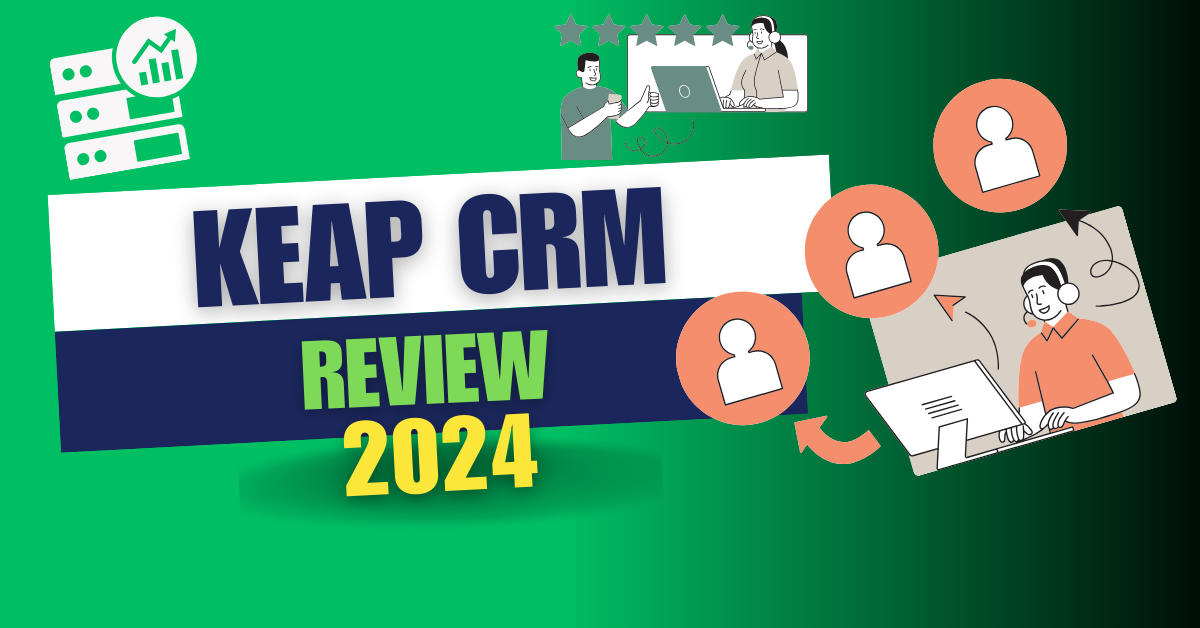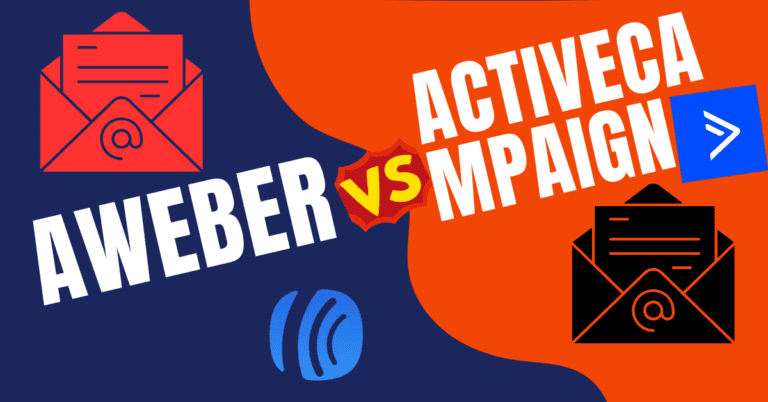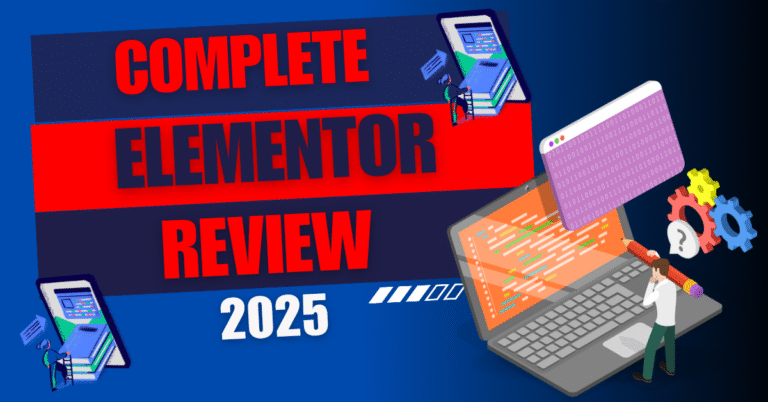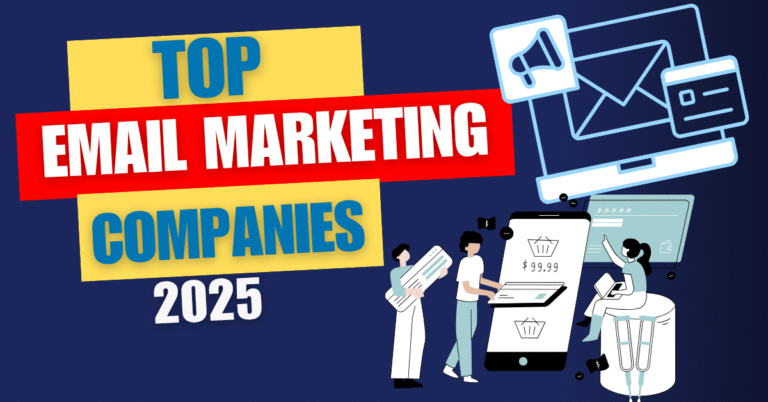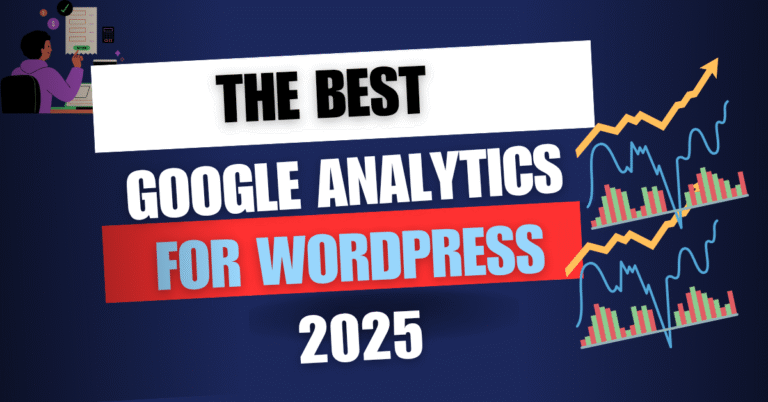When you purchase through our links, we earn commissions at no extra cost to you.
Small businesses frequently face certain challenges in maintaining client relationships, increasing revenue, and simplifying operations—all while focused on growth. Keap comes in as a sophisticated small business CRM designed exclusively for organizations who want to automate repetitive activities, improve customer interaction, and accelerate growth. Keap has subsequently adjusted its focus to create a more streamlined, powerful suite that meets the demands of small and medium-sized businesses.
This post will guide you through Keap’s key features, simplified pricing structure, and the advantages of each implementation package to help you decide if Keap is the right small business CRM for you.
What is Keap?
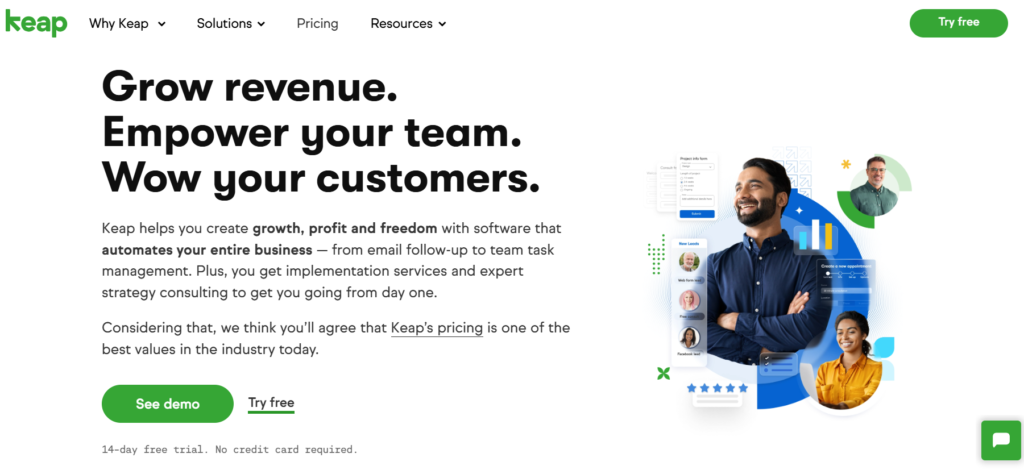
Keap (formerly known as Infusionsoft) is aimed at assisting small company owners and those new to CRM technologies by providing an all-in-one solution for managing client connections and automating marketing duties. Keap integrates critical sales and marketing automation into a single platform, making it a valuable asset for small e-commerce enterprises and service providers seeking to optimize their operations.
In addition to CRM capabilities, Keap adds invoicing functionality and interfaces with leading payment processors to streamline the checkout process and boost revenue. The platform’s automations may save customers up to 10 hours each week by handling activities like automated text and email follow-ups and gathering new leads directly from landing pages or social media. Keap helps small businesses simplify their operations and focus on growth by providing a simple drag-and-drop sales funnel builder and dedicated customer success manager assistance.
Keap CRM Editor’s Rating | 9.4/10 |
|---|---|
Ease of Use | 9.8/10 |
Value for Cost | 9/10 |
Features | 9.3/10 |
Integrations | 9.5/10 |
Support | 9.4/10 |
⭐⭐⭐⭐
Rating: 4 out of 5.Keap features: empowering small business CRM
Sales Automation
Keap’s sales automation features are intended to automate every stage of the sales process, making it an effective small business CRM solution. The platform supports both simple and advanced automation activities, with a variety of configurable templates.
Easy automations enable you to build basic triggers using a simple “when-then” formula, making them suitable for enterprises that demand continual client contact. You may, for example, automate follow-up actions on delinquent bills, set up appointment reminders, and notify team members of new form submissions.
For deeper situations, Keap’s advanced automations allow you to build alternate routes based on conditions and client responses. This allows firms to set specific standards, such as asking for analyses from top clients or responding to input from unsatisfied consumers. Keap’s sales automation enables small businesses to respond quickly, create deeper client connections, and manage processes more efficiently.
CRM Functionality

Keap’s CRM was designed to assist small businesses in managing customer data, streamlining communication, and reducing the need for many spreadsheets and notes. This small business CRM saves important customer information, scores leads based on their purchase potential, and helps them through the sales funnel. With unified information, company managers can easily store personal notes, monitor purchase histories, and evaluate quotations, ensuring that no details are neglected. Keap automates lead tracking and customer data management, giving small businesses a single, structured area to nurture prospects and close more transactions.
Reporting
Keap’s reporting features are broad, providing deep insights that go beyond traditional small business CRM analytics. While many systems track basic data like new leads, closed transactions, and predicted income, Keap goes a step further by tracking reviews, appointment outcomes, quotations, and conversion rates by audience group or sales stage. Users may access over a dozen pre-built reports and trackers, allowing data-driven enterprises to make educated decisions and improve their strategy. Keap’s reporting provides small businesses with the visibility they need to recognize trends, enhance performance, and drive growth effectively.
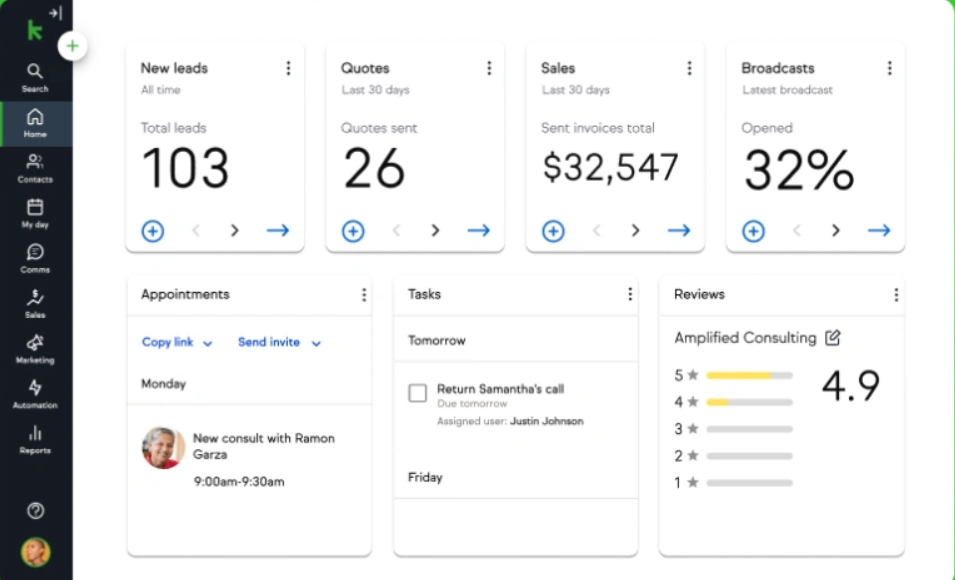
Email Builder
Keap’s email builder enables small businesses to produce professional, efficient email campaigns in minutes. The drag-and-drop editor and adjustable templates make email marketing simple and accessible to anybody, including novices. Keap’s automatic email capability is especially useful for sales follow-ups, since it ensures that communication is constant and that tasks go smoothly. Businesses may target particular audiences by combining automated emails with list segmentation, which increases engagement and conversion rates. This feature-rich email builder makes Keap an excellent alternative for small business CRM users looking for an all-in-one marketing solution.
Integrations
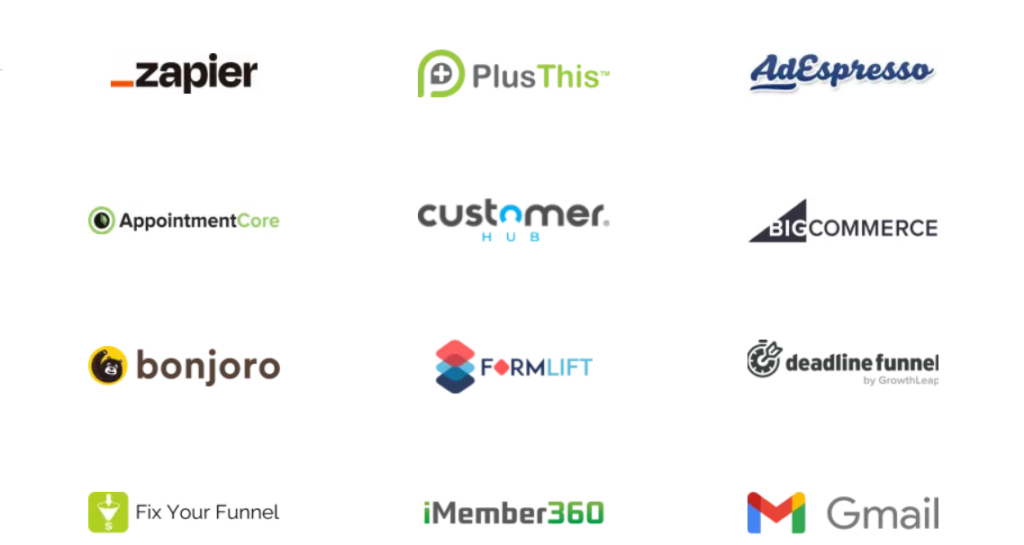
Keap stands out for its vast integration capabilities, which integrate with over 2,500 tools and platforms to assist corporate operations. This small business CRM interfaces with essential software for email marketing, lead creation, and pre-built campaigns, as well as special apps designed for specific business needs. Keap’s marketplace provides both official partner connectors and third-party solutions, making it one of the most adaptable alternatives for CRM users. While certain integrations might charge additional fees, Keap’s connectivity allows small firms to create a personalized, efficient technology stack.
Lead Scoring
Lead scoring, which is included with Keap’s Max plan, assesses each prospect’s level of interest according to their interactions with your company. This tool tracks web form submissions, clicked links, read emails, and allocated tags, allowing organizations to focus on high-quality prospects. Keap’s lead scoring is completely adjustable, allowing users to apply various weights to certain actions and even deduct points if a lead shows disengagement, such as ignoring several emails. This level of customisation enables sales teams to focus on promising prospects, increase productivity, and enhance revenue.
Keap Pros and Cons
Pros
- User-friedly automation
- Smooth service delivery
- Highly targeted email campaigns
- Sales and Marketing automation
- Comprehensive support
Cons
- High starting cost
- Some integrations charge extra fee
Pros
Unified Sales and Marketing Automation: Keap unifies sales and marketing automation into a single, easy-to-use platform, saving small businesses time and eliminating the need to manage several software packages.
User-Friendly Automation and Workflow Creation: Keap’s platform includes a choice of configurable templates as well as an intuitive drag-and-drop editor, allowing users to create both simple and complicated automations without the need for technical experience.
Streamlined Service Delivery: Keap streamlines marketing and sales operations, from lead capture to follow-up and closing deals, all in one integrated CRM. This process simplification enables small businesses to increase efficiency while focusing on client engagement.
Automated Lead Management and Scoring: Keap enables companies to automatically gather and score leads, providing sales teams with a clear picture of which prospects to focus on. This functionality is especially useful for small firms trying to increase efficiency in their sales operations.
Comprehensive support: All Keap plans include a personal customer success manager, as well as 24/7 chat and phone assistance from the United States, all of which can be accessed immediately from the Keap app.
Cons
Integration Fees: Although Keap interfaces with over 2,500 third-party applications, some integrations charge an extra monthly fee, which might raise expenses for organizations wishing to grow their ecosystem.
Scaling Contact-Based Pricing: Keap’s free data transfer service is rather restricted, with contacts, 10 items, and one landing page. For enterprises wishing to move large amounts of data, this constraint may necessitate the use of a premium migration option.
High starting cost: Keap’s pricing starts at $249 a month, which might be too expensive for startups or small enterprises, particularly when compared to competing CRM platforms.
Keap Pricing
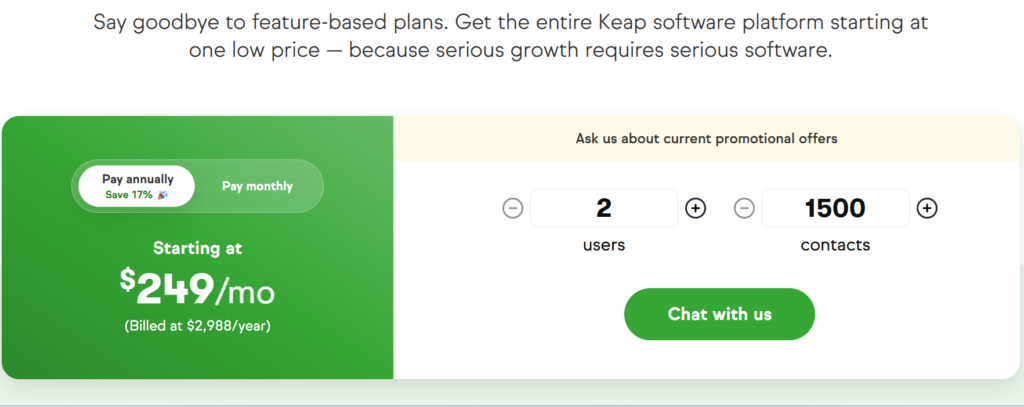
Keap has changed its pricing approach to offer its complete platform as a single, streamlined package rather than different feature-based plans. This new method gives companies complete access to Keap’s entire CRM and automation solutions for a starting price of $249/month when paid annually ($2,988/year).
Here’s what this pricing model includes:
- Full Access: Keap now includes all available features in this package, allowing customers to use CRM, sales and marketing automation, appointment scheduling, payment processing, lead tracking, and other tools without having to subscribe for further capability.
- User and Contact Limits: The standard plan includes two users and up to 1,500 contacts. As the firm grows, additional contacts or users can be added for a cost.
- Annual Savings: Choosing an annual billing cycle saves businesses 17% compared to monthly billing, encouraging them to invest in a long-term solution for their CRM and automation needs.
Implementation packages
Keap’s implementation packages are designed to assist companies in setting up and optimizing the platform based on their individual growth requirements. These packages—Ignite, Grow, and Scale—provide varied amounts of support to businesses at various stages. Each includes setup assistance, automation, data transfer, and regular strategy calls, with more resources and support available as you progress through the levels.
Features | Ignite | Grow | Scale |
|---|---|---|---|
Proven Automations | 5 | 10 | 15 |
Automations Launched for You | 2 | 3 | 5 |
Migration Services | Up to 15 hours | Up to 20 hours | Up to 25 hours |
Third-Party Integration | Up to 2 | Up to 3 | Up to 5 |
One-Time Investment | $1,500 | $2,500 | $3,500 |
Important links:

